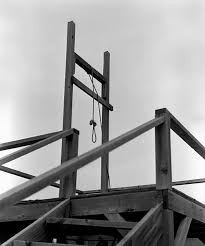At the climax of Luke’s passion narrative, we see Jesus hanging between two criminals. One of the criminals mocks Jesus, but the other responds, “Do you not fear God, since you are under the same sentence of condemnation? And we indeed justly; for we are receiving the due reward of our deeds; but this man has done nothing wrong.” And he said, “Jesus, remember me when you come in your kingly power” (Lk. 23:40-42). Given the current debate that has once again erupted around the Church’s teaching on capital punishment, some may have preferred Jesus to have taken the opportunity to correct the repentant thief and say something to the effect of, ‘Crucifixion is not the due reward for any deed. It is an attack on your inviolability and dignity as a person; regardless,’ “Truly, I say to you, today you will be with me in paradise” (Lk. 23:43).
Prior to the most recent declaration by Pope Francis and the subsequent revision of paragraph 2267 of the Catechism of the Catholic Church, the debate could be boiled down to the question ‘when should a legitimate authority utilize capital punishment?’ Paragraph 2267 of the Catechism used to begin with this sentence: “The traditional teaching of the Church does not exclude, presupposing full ascertainment of the identity and responsibility of the offender, recourse to the death penalty, when this is the only practicable way to defend the lives of human beings effectively against the aggressor” (CCC 2267). Because the legitimate authority is entrusted with the protection of the common good it has an obligation to defend the lives of its citizens. The paragraph goes on to list criteria necessary to justify the use of capital punishment and concludes with Pope St. John Paul II’s famous words from Evangelium Vitae paragraph 56 that today these criteria “are very rare, if not practically non-existent.”
It may come as a shock to some readers, but implicit in this traditional formulation of the Church’s teaching on capital punishment is that it is good. It is not a “necessary moral evil” that the Church merely permitted in limited circumstances. If that were the case, then this teaching would contradict the basic moral principle that “one may not do evil that good may come of it” (CCC 1756). Paragraph 81 of Veritatis Splendor develops this principle further: “If acts are intrinsically evil, a good intention or particular circumstances can diminish their evil, but they cannot remove it. They remain “irremediably” evil acts; per se and in themselves they are not capable of being ordered to God and to the good of the person.” The conclusion, therefore, is that the justified execution of a criminal is a good act; i.e., an act that can be “ordered to God and to the good of the person.” I think that’s a bold statement, so I will say it again rephrased: The traditional teaching of the Church justified use of the death penalty, that is in accord with Divine Law, it is for the common good, and it is for the good of the individual. Don’t try to do any mental gymnastics to say that the death of the individual isn’t really willed but merely a necessary consequence of the state protecting the common good. The death of the guilty individual (a physical evil) is directly willed because it is for his good and the good of society.
Granted, as the Catechism used to say, the death penalty was a last resort. This is because there is literally nothing more drastic (within the realm of what is morally good) that can be done to remedy the situation. St. Thomas compares it to severing a diseased limb from the body. The physical evil of cutting off a leg is morally evil when it is done without just cause, but if it is necessary for the preservation of the person’s life, then it is morally praiseworthy. The same is true for the sinner who is too great a threat to be dealt with through less drastic means (cf. II-II, Q. 64, a. 2).
More time could certainly be spent unpacking the body of Church teaching on the death penalty; however, the purpose of this article is more to grapple with what is novel about the revision to the Catechism.
So, if the moral object, ‘justified use of capital punishment’, is good, then what does it mean for Pope Francis to say, “the death penalty is inadmissible because it is an attack on the inviolability and dignity of the person”? (CCC 2267, revised). This isn’t simply a comment on a change in circumstances; i.e., he isn’t saying that because we have adequate prison facilities, there is no longer a need for the death penalty, which, in contrast, was what Pope John Paul II had done in Evangelium Vitae. The CDF’s clarifying letter says this:
“The death penalty, regardless of the means of execution, “entails cruel, inhumane, and degrading treatment.” Furthermore, it is to be rejected “due to the defective selectivity of the criminal justice system and in the face of the possibility of judicial error.” It is in this light that Pope Francis has asked for a revision of the formulation of the Catechism of the Catholic Church on the death penalty in a manner that affirms that “no matter how serious the crime that has been committed, the death penalty is inadmissible because it is an attack on the inviolability and the dignity of the person.”” (CDF Letter, June 28, 2018, 6).
The CDF here presents three main arguments, which can be put more succinctly: 1) The death penalty is cruel and inhumane. 2) There is a danger that an innocent person may be put to death. 3) It is contrary to human dignity. I will address each in turn.
First, the letter states that the death penalty “entails cruel, inhumane, and degrading treatment.” This is true; however, these are words that contain a great deal of tension. They are emotionally loaded, and, for most people, they presume something morally evil is necessarily taking place (i.e., they presume an intrinsically evil act). That, however, cannot be the case with the death penalty since, as previously discussed, there are morally good occasions for its use. This is more easily seen if we use a less contentious example. Placing someone in prison, for example, could be described as cruel, inhumane, and degrading treatment. Man is made to live freely, so it is cruel to take away that freedom. And the Church does condemn the imprisonment of innocent people for this reason; however, the Church does not condemn the imprisonment of those who have committed crimes that warrant imprisonment (cf. CCC 2297-2298). Therefore, although the terms cruel, inhumane, and degrading are valid words to use in this context, they can be misleading without clear definitions being provided. I will develop this further in the third point because it addresses the precise words used in the new version of paragraph 2267, which present us with the same challenge. Here my point is simply that describing the death penalty as “cruel, inhumane, and degrading treatment” is true, depending on how one defines the terms, but it doesn’t mean that the death penalty is intrinsically evil.
Second, the CDF’s clarification acknowledges the possibility of judicial error. This danger was also acknowledged in the previous version of paragraph 2267 with the subclause, “presupposing full ascertainment of the identity and responsibility of the offender…” Mistakes have been made and the judicial process isn’t perfect, so the possibility of an innocent person being condemned should, I agree, be taken seriously as a reason for withholding the use of the death penalty. However, it also seems to be an insufficient argument to totally ban the death penalty, because it is possible to know, as previously stated in the original version of 2267, that in some or many cases the identity and guilt of the criminal can be known without doubt.
Third, the primary reason given for the change is, “the death penalty is inadmissible because it is an attack on the inviolability and dignity of the person”, which is the same quotation from Pope Francis that is used in the new version of 2267. Once again these are emotionally weighty words, and without clear definitions, it is easy draw false conclusions. It would certainly be easy to read this statement as saying that the death penalty is intrinsically evil, but it doesn’t say that. In a certain respect, every punishment is an attack on the person being punished. In order to make restitution for and correct bad behavior “violence” is done to individuals. For example, a child hits his brother, and the father responds by giving the boy some quiet time (That’s not a euphemism. I just mean time by himself being quiet). The “violence” done to the offending child is simply the removal of his freedom to move about for a few minutes. This violence is done for the sake of improving the child’s behavior in the future despite, of course, the fact that the moment of punishment is disagreeable. This argument may sound like semantics, but it is important to understand the terms clearly. The correction of bad behavior (non-culpable) or evil behavior (culpable) through punishment necessarily involves some form of violence or “attack”; however, despite their provocative connotations in modern vocabulary, they do not mean something morally evil is necessarily being done.
Now, what about the “dignity” part of the assertion? What is human dignity? The Catechism says, “The dignity of the human person is rooted in his creation in the image and likeness of God; it is fulfilled in his vocation to divine beatitude. It is essential to a human being freely to direct himself to this fulfillment” (CCC, 1700). When something is done to prevent man from acting freely toward his true good, it is an act contrary to his dignity; however, what if someone isn’t acting for his own true good or the good of others? Man’s true good is to reach heaven and to be with God. His true good is not to do whatever he wants in a given moment. Man is quite capable of acting contrary to his own true good (that’s what he does when he sins), and the fact that human beings do sin is the reason why punishment is necessary. Throughout the Bible, God uses punishment to correct the evil behavior of human beings: The exile of Cain, the plagues of Egypt, Elijah executing the prophets of Baal, the Babylonian exile, and Jesus making a whip to drive the money changers out of the Temple are just a few examples of God punishing people for their own good. This process of punishing evil behaviour, which is contrary to man’s dignity in the moment while ultimately directing him to a higher good, is also known as discipline.
The purpose of discipline is to sacrifice present goods for the sake of future higher goods – the disciplined person has violence done to him or he does violence to himself for the sake of a higher good. In a sense this is contrary to the dignity of the person because something good is taken from the person or voluntarily given up (e.g. food, sex, freedom of movement, even possibly the person’s life). These things are good, they are all gifts from God, but they are goods that need to be ordered to the highest good (i.e., life with God); therefore, they can each be sacrificed for the sake of the highest good. However, not only can they be sacrificed directly for the highest good (e.g., the martyr who offers his life to God or the consecrated virgin who sacrifices married life to draw more closely to God in this life), the goods of this life can also be sacrificed for intermediary goods on the path to heaven (e.g., fasting for the sake growing in temperance or living in a cloister for the sake of being more readily disposed to a life of prayer). It is clear from Scripture and Tradition that the process of discipline is necessary for our sanctification and getting to heaven.
When deciding how to discipline oneself or a person for whom one is responsible it isn’t always easy to decide what is just and prudent. The books published on how to discipline children and ourselves are a never ending stream of advice on what is best, but they don’t all agree. The question is not whether discipline is good and necessary, rather, it is ‘what constitutes just and prudent discipline?’
I would like to propose that the new version of 2267 is stating that the death penalty is no longer a prudent form of discipline because of our modern context. That’s not a controversial thing to say. Pope St. John Paul II said the same thing, but his argument was based on circumstances that he argued made the death penalty no longer necessary, and thus utilizing it would be imprudent. Pope Francis, on the other hand, points to a change in our awareness of the dignity of the human person as cause for the death penalty being inadmissible. Now, the Church has always been aware of and taught about the inherent dignity of every individual. This teaching is, for example, the foundation of our arguments for the immorality of abortion and euthanasia. The argument is simply that just and prudent use of capital punishment does not contradict our beliefs about human dignity. Society in general, however, does not have the same beliefs about human dignity that the Church does. Perhaps we could say that because society is now more aware of some kind of inherent dignity, even of the worst criminals, but it is unable to offer an explanation of the larger context of the common good and man’s true end, then it would be imprudent to utilize the death penalty.
The fact is that the text doesn’t give a clear theological or philosophical explanation for the revisions to the Catechism. Further discussion of what this “increasing awareness” regarding human dignity and the new understanding “of the significance of penal sanctions imposed by the state” (CCC 2267, revised) are certainly worth while. I have tried to show that the text is not making a definitive change to Church teaching on the death penalty. It does not say that the death penalty is intrinsically evil. However, it does leave us with unanswered questions.











